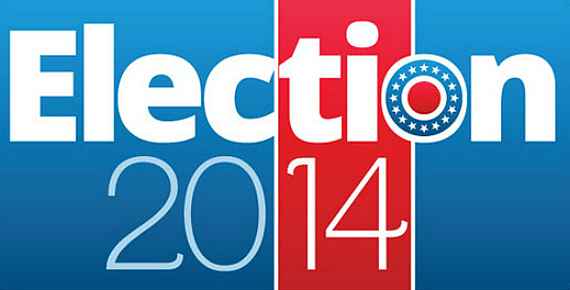Providing a Little Perspective on the Elections
Political scientists tend to be less dramatic than commentators.
 Some boring political scientists provide a little perspective:
Some boring political scientists provide a little perspective:
First, Hans Noel, who’s post title should be a mantra for all pundits: No one election should be interpreted in isolation. (the post itself is fairly brief and not easily excerpted, so I recommend a click-through.
Second, Seth Masket: Shellacking 2: The Shellackening — Some Perspective. He notes that if we compare yesterday to midterms from 1950-2010 we find the following:
- The president’s party lost roughly 12 House seats. The average is 25.
- The president’s party lost roughly 8 Senate seats. The average is 3.
- The president’s party lost roughly 8 state legislative chambers. The average is 10.
So while the Senate change is quite a bit larger than average, the other two indicators are actually lower (and, as I noted yesterday, this Class of the Senate was especially favorable to the Republicans. This strikes me as useful data when trying to decide how dramatic yesterday was, or was not.
I would also note one of Masket’s visuals (and would recommend visiting the link for more info):

I have had a pretty busy day so have been limited in how much time I have been able to devote to post-election discussions, but I must confess that there seems to be a lot more drama going on at the moment from adherents of both parties than is warranted from the results. Starting last night Republicans were too jubilant and Democrats too morose than strikes me as warranted given what we should have been expecting yesterday. History and structural conditions dictated a very Republican outcome. While I recognize that it was a more successful night for the GOP than many had assumed would be the case, it seems to me that the basic results were not radically out of line with what should have been expected (and, quite frankly, the actual result is not that different than the expectation).
Just consider the basics:
1. Mid-terms favor Republicans in terms of turnout.
2. Mid-terms are harder to poll than presidential years (which affects the quality of predictions).
3. Class 2 of the Senate favored Republicans
4. And don’t forget: the basic structure of House elections favors Republicans.
5. The economy is still sluggish, which favors the part out of power (i.e., the Republicans).
6. The president’s approval numbers are weak (which helps Republicans).
All of this pointed to a big Republican outcome, yes?
I would note: 2010 was a pretty bad year for Democrats (most of my list above would also apply to that election). It was the election of the Tea Party and was supposed to signal a major repudiation for Obama and the Democrats (and yet, Obama was re-elected in 2012, and fairly handily). As such, I would caution against projecting this year’s outcomes into 2016. Too many people are treating this like a big football win and projecting a win in next week’s game and the week after that. However, that’s not how it works: you still have to play the game and conditions next week are not necessarily going to be the same as they were for the big win this week.
(See also: Jonathan Ladd’s post, Implications of the 2014 Midterm Election Results)






Thank God Obummer was put in his place last night…his policies have ordinary Americans struggling at the gas pumps…..oh wait…hmmmm….. Benghazi!
Steven, I’m about half way through your book and I thank you and hate you at the same time. I thank you because I’m learning so much. I hate you because it makes me realize how ignorant I was. I was a physics major and considered political science and literature to be an inconvenience.
It seems undeniable that this was not a “Republican mandate” however defined. It also seems undeniable that this was a repudiation of Obama. Indeed, he put himself out there as such.
An awful lot of ink has been spilled to justify the former and deny the latter. But they are actually, it seems to me, modest observations. Ignoring them comes with heightened risk. However Obama’s opening salvo today seems to indicate his intentions to do just that.
If you rewind just a couple of months, other than maybe Colorado and Iowa, what happened in the Senate was pretty much what was expected to happen. The story turned out great for the media, as things looked a little more exciting there for a while, and now right after the election, it looks like a “surprise”. But really, not so much.
@Guarneri: Yes, it’s a protest vote. A lot of people voted to show the Democrats their anger but that doesn’t mean a whole-hog endorsement of Republicans. I expect they’ll get themselves tossed out just as quickly as did Demoxrats.
Democrats didn’t lose because “hate” or because “turnout” or because “candidates in red states”: none of these excuses explain why Democrats lost so heavily in gubernatorial and state legislative races. Note that the party lost elections while left of center initiatives won across the country in the form of minimum wages, paid sick leave, drug legalization, etc. Also note the Democrat in Congress furthest to the left, Alan Grayson, won by double digits while conservative Democrats got kicked in the nuts.
Democrats lost because:
https://pbs.twimg.com/media/ByWMXacIcAEagcB.jpg
You can only spit in the face of your own base so long before they leave to bathe.
Cycles, pstterns, phases ,trends, and predicted results: that is what we have here. A few surprises; there always are. Not some ground shaking, unheard of event as most news channels are saying.
@Guarneri:
Reagan lost control of the senate in his last midterm, but continued governing as if he still had a mandate. Was he wrong to do so?
@Ben Wolf: Turnout is a significant variable in understanding the difference between mid-terms and presidential cycles. This is pretty undeniable.
@Ron Beasley: I can take that combo of like and hate! 🙂
I am please to hear that you are enjoying the book.
Thanks for the post, Professor. It pretty much matches my analysis. It doesn’t quite explain why the Republicans did so well, though, reaching the higher levels of what was predicted by the polls.
I would add the following observations:
1. The substantial differences between an older, whiter, more conservative off year elecorate and a younger, more diverse, more electorate are now “baked in the cake”. The Democrats understood that they were tremendously disadvantaged by this difference , and tried mightily to GOTV this cycle but it just didn’t work.
2. This being the case, I propose the following hypothesis:
In off year elections, puple states become red states and blue states become purple states.
This explains Republican successes in ostensibly blue states.
3. Unfortunately, this ratchet effect doesn’t happen in red states, which remain reliably red no matter which election cycle.
This means that the Democrats probably need to adjust their campaign strategies to deal with this effect, which we might call the Purple State Ratchet, or some suitably catchy name :-).
It also means we should probably stop talking about mandates or at least think “Mandate for which electorate?”
Finally, I think “wave” elections aren’t going to be occassional: rather, they are going to be standard.How big a wave is going to depend on which set of states come up for election each cycle.
Steven, why are you trying to deprive the media of their comfortable narratives? As a headline, “Normal Sixth Year Election” isn’t going to sell many papers.
@stonetools:
Was that true in 2006, Bush’s 2nd midterm election? I thought that some reliably red states went purple then.
I think the mechanism you suggested is actually correct, if you add the factor that the movement only works against the sitting President’s party.
@gVOR08: I think that is mostly the issue: much of this is about the media generating hype because that generates interest.
I do think that there are significant aspects of the election (and it was undeniably a good day for the GOP) but the celebration/gnashing of teeth strikes me as out of proportion.
(Also, I am increasingly convinced that a lot of the outcomes are driven substantially by structure and are not as truly democratic as we think they are–but that is a long-term issue).
@george:
I agree, 2006 is an exception. However, the spectacular imposion of GWB’s Iraq policy-occurring nightly on national TV- is my explanation for that, plus the “Six Year Itch” syndrome.
@stonetools:
Actually I think what you’re calling an exception is pretty much the norm for modern 2 term presidents – except for Truman, the only time they don’t lose ground in the 2nd midterms is when they were already down. Even popular presidents like Reagan and Eisenhower lost ground at that point.
I’ll note that both Reagan and Eisenhower kept governing as if they had a mandate after those elections, probably at least in part because they interpreted the midterm loss for what it was – the six year itch.
@george:
I expect Obama to follow suit-amidst lots of Republican protest and talk of mandates, repudiation of the Obama agenda and that old standby-“flouting the will of people.”
@stonetools:
Just in my own neck of the woods, I think the opposite happened. There were plenty of mailers and phone calls, but the only canvassers we got this year worked for Tillis. I thought it was an act of desperation because of the polls, and the polls turned out wrong. 🙂
@Tillman:
I hear the Republicans did up their GOTV effort this cycle and that probably contributed to them outperforming the polls.
I think there’s quite a lot to this analysis by Dan Drezner. His conclusion:
“None of this obviates the erosion of a pretty basic assumption in American politics: implementing successful policies — like arresting a slide into Depression or expanding health-care coverage — does not necessarily translate into successful political outcomes. And if politicians find that they can be rewarded for either bad policies or sheer obstinacy, that’s what they will give the voters.
Which is not good for the country.”
Normal mid-term, wave, or whatever, the Senate will be vastly different for a few years. Net progress, however, towards a more rightist government and rightist legislation, that is, right of center not far right, will not be particularly successful, simply because Obama will wield the veto pen with alacrity and dispatch. The tally of veto’s will define the public perception of how left of center politicians would govern from 2016 onward, which will redound to the Republican candidate’s favor I believe.
.It was interesting to note that Reid stopped any consideration of House legislation to the tune of around 375 bills, which received very little heat from anyone, all things considered, because it was the mantra of the left that the Republicans blocked everything, when in fact Reid’s Senate did the blocking of almost any Republican initiative. Yes, the Republicans did block Obama’s legislation, since it was considered to be faulty, so the net progress was near zero!
Now it will be up to Obama to veto or pass Republican legislation, clearly and openly demarking the left’s agenda from the right. The GOP will most certainly keep score and publicize the results.
@Todd: Sorry, but that’s just not true. A couple of months ago we were hearing about Kansas. We were hearing about the inevitable runoff in Georgia, and whether McConnell might get booted out. We were definitely not talking about a squeaker in Virginia. If someone mentioned Tillis, I don’t remember it. Beyond that, I know you just said Senate, but a lot of stuff happened in the state capitals that none of us were expecting. The way that 90% of the could-be’s and 40% of the no-chance’s broke the same way makes it a story.
@mannning: I’m not so sure where Conservatives are getting this idea that President Obama will have to use his veto pen all that often. Surely it will happen much more frequently than the two time in the previous 6 years. However, legislation that is unlikely to be signed by the President (such as those 375 House bills) will probably not make it out of the Senate these next two years either. The Democrats have access to the same delaying and killing tools (filibusters, holds, etc) that the Republicans have wielded so effectively for the past 4 years. There will certainly be some “just for show” bills (repeal the ACA) passed via the reconciliation process that the President will veto. But for the most part, any normal bills that make it out of the Senate will probably be something that has been pre-negotiated with the President, and is very likely to be signed.
And no, Mitch McConnell will not eliminate the filibuster entirely just to make President Obama use his veto pen more often.
@mannning:
I think this would be a very positive scenario for the country, as it would generate a stark policy contrast.
However, this is not what is going to happen.
@Pinky: I’m talking about before we were hearing about Kansas, or South Dakota, or Georgia, or Kentucky, or any of the other places where Democrats were very unlikely to win. Conventional wisdom, until relatively recently, was that the Republican were very likely to get the Senate Majority, and pick up House seats in 2014.
I’m not sure exactly what caused some of the governors and State legislature races to go the way they did. But I am sure of one thing, I agree with James Joyner: https://www.outsidethebeltway.com/america-still-not-a-center-right-nation/
@Pinky: Yes, the media hyped all those things (as they are wont to do). And some of the polling was off (as it often is at the case in local races).
While I agree that the overall outcomes are more favorable to Republicans than many predicted, the basics are not that far off from what was expected (unless one in is the media and needs more hype to get attention).
@Todd: I think you’re misremembering. Conventional wisdom leaned toward a GOP takeover of the Senate, but if you go back before a few months ago, before it was talk about Brownback and Roberts, it was talk about Nunn, or Judd, or Walker, or Davis.
@Pinky: Pinky, I’m not misremembering. I’m sure it’s more likely that we are looking at this through different lenses. I am remembering the debates about the polling models back in the summer … and the difference between the ones that included “fundamentals” and the ones that didn’t. Other than Sam Wang, I believe all of the models never showed the Democrats being more likely than not to retain control of the Senate … because they all factored in the idea that Conservative were more enthusiastic than the polls were likely to indicate.
That’s exactly what happened. Conservatives are more passionate than other voting blocks, and therefore more likely to turn out on election day. But that does not mean that more Americans are necessarily supportive of Conservative ideas.
@Todd: I think we’re basically agreeing.
@Steven L. Taylor:
I think what we will likely see is not Obama’s veto pen, but Reid’s filibuster, along with obfuscatory headlines like “Congress fails to pass personhood amendment”, which hide what is really happening and contributes to a “Congress is broken ” vibe and a general disgust with government.
@Steven L. Taylor: Of course turnout is a factor, but the reasoning in this case is that Democrats just didn’t feel like it or weren’t as angry and so didn’t show up. Their voter base didn’t turn out because Democrats, on economy and on jobs, have been the party of hopelessness.
What I’m saying is that “turnout” is being presented as a variable over which Democrats had no control, akin to a force of nature. It’s a method of deflecting blame from a leadership that needs to change immediately. If Pelosi, Reid, Israel etc. care about the fate of their party they will bow out gracefully and let new blood take charge.
@Steven L. Taylor:
I look at it this way: Whatever the Senate Dems do, and whatever the President does, will be cataloged and hyped as heading America the wrong way. If they filibuster, or hold, or vote nay, or veto the score will see the light of day, thanks to Republican publication efforts. Thus, the contrast will be much more obvious than it has been to date, and obstructionism will be the tag for Dems this time. Sure, a few bills may be pre-negotiated, but not many, and the idea that Obama would be faced with a three-foot-high stack of right-leaning bills to do something with is intriguing.
@Ben Wolf: Well, the point would be that behaviorally speaking, turnout is always lower in mid-terms and, further, Democratic turnout is typically lower than Republican turnout. This has implications.
@stonetools:
“I think what we will likely see is not Obama’s veto pen, but Reid’s filibuster, along with obfuscatory headlines like “Congress fails to pass personhood amendment”, which hide what is really happening and contributes to a “Congress is broken ” vibe and a general disgust with government.”
I doubt it. Instead, you will see lots of so-called liberal media types of the David Broder school decrying the Democrats for being obstructive, when they cheered Republicans for standing by their principles.
@Steven L. Taylor:
I think your “perspective” is way off base. You can’t pickup seats you already have. You’re attempt to minimize Republican gains by comparing them to other cycles is really misleading. An honest examination would determine where Republicans were starting from. The fact is that Republicans significantly increased an already solid majority in the House and when the races that are too close to call right now are finally decided, Republicans will have one of the largest Republican majorities in history. Also, Republicans already had a huge majority of state legislative chambers going into the election. They picked up 8 more without losing a single one. Republicans now control 68 of 98 legislative chambers, also a historical record. Republicans now have full control in 24 states, Democrats 6.
The fact is that Republicans had a nearly perfect night on Tuesday. They outperformed every expectation. Races that were supposed to be close turned into blowouts. Races that were afterthoughts turned into nailbiters. And, from what I’ve been reading, the only people trying to minimize what happened on Tuesday are partisan Democrats. Hmm.
@Gavrilo: It is fair to note that the Republicans already had a pretty good starting spot and so it is fair to take that into consideration when evaluating the number (although to truly do that would require making a historical comparison of all the mid-terms in question and the relative starting spots in question).
However, don’t accuse me of partisanship when I am pointing to facts and historical trends and your retort is based on your subjective views of Tuesday.